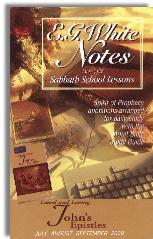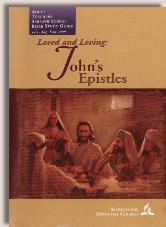|
||||||||||||||
Commentary on "Walking in the Light:
Keeping His Commandments"
Day 1: Sabbath Afternoon, July 18, 2009
Overview
This lesson uses an illustration of infidelity to emphasize the point that if you love someone, it needs to be reflected in our actions, not just by what we say.
Problems
The previous statement is true, but the underlying message is one of obedience to the 10 commandment law (Old Testament/Old Covenant). If we truly love God, we will obey the 10 commandments as proof. The emphasis still rests on obedience to the Old Covenant law rather than being “in Christ” or living by the Spirit—the New Covenant mandate for believers. Living with Christ at the helm of our life (indwelt by the Holy Spirit) elevates our behavior considerably from when we were “slaves under the law” (Gal. 4:7; 5:3-5). The bottom line for Seventh-Day Adventists is still Sabbath adherence, the 4th commandment. Otherwise, the New Covenant “commands” would be sufficient. All other commandments, other than the 4th, are reiterated in the New Testament, with an even higher standard of conduct. This illustration should emphasize that the standard of morality comes from a response to the living Christ (love) and not as an obligation to specific laws in the Old Covenant (Rom. 7:6).
In “The Week at a Glance” it asks, “What does it mean to know God, as opposed to just knowing about Him? What role does obedience to God’s law have in our relationship with God? What does John say about Jesus as a role model for behavior? What is the “New Commandment” that John gives, and how “new” is it really?” Knowing God implies a personal relationship with Him through the Holy Spirit in us, versus knowing facts, character traits, and objective data about Him. This is the difference of the New Covenant. Because it’s a better way, pointing to Christ and led by the Spirit, it transcends perfunctory rule-keeping. As it says in 2 Cor. 3:7-11,
“Now if the ministry of death, chiseled in letters on stones, came with glory, so that the sons of Israel were not able to look directly at Moses’ face because of the glory from his face—a fading glory—how will the ministry of the Spirit not be more glorious? For if the ministry of condemnation had glory, the ministry of righteousness overflows with even more glory. In fact, what had been glorious is not glorious in this case because of the glory that surpasses it. For if what was fading away was glorious, what endures will be even more glorious.”
While Christ came and lived a sinless life, and died to become sin for us, our only hope of living a godly life is to live a spirit-filled life. It’s only by His power we can demonstrate the selfless love and life God calls us to as believers—not by our own self-control. The New Commandment John gives is new because it’s about Christ and His power in us. The Old Covenant laws merely pointed to Christ—we don’t need the “guardian” (law) anymore because we now have the Spirit (Gal. 3:24-26).
Summary
- The word “commands” or “commandments” by John is not referring to the Old Covenant 10 Commandments, but rather “instructions” or “teachings” (Greek “entole”).
- The emphasis and automatic default to the 10 Commandments whenever “commands” is mentioned speaks for the increased importance placed on Old Covenant Sabbath keeping. Texts are stretched to reinforce S.D.A. theology.
- The New Testament higher standard of conduct is based on our personal relationship to Christ and our intrinsic desire to do His will when we truly understand who He is and who we are. This is only possible through the work of the Holy Spirit in us.
- Our salvation and power in Christ has nothing to do with us and everything to do with God’s grace and love for us.
- Because we have Christ, the guardianship of the law is no longer needed. Christ is a better motivation for keeping His commands and living a Christ-like life.
Copyright 2008 BibleStudiesForAdventists.com. All rights reserved. Revised July 23, 2009. This website is published by Life Assurance Ministries, Glendale, Arizona, USA, the publisher of Proclamation! Magazine. Contact email: BibleStudiesForAdventists@gmail.com.
The Sabbath School Bible Study Guide and the corresponding E.G. White Notes are published by Pacific Press Publishing Association, which is owned and operated by the Seventh-day Adventist church. The current quarter's editions are pictured above.
Official Adventist Resources
Standard Edition Study Guide Week 4
Teacher's Edition Study Guide Week 4
Easy Reading Edition Study Guide Week 4
Search the Complete Published Ellen G. White Writings


